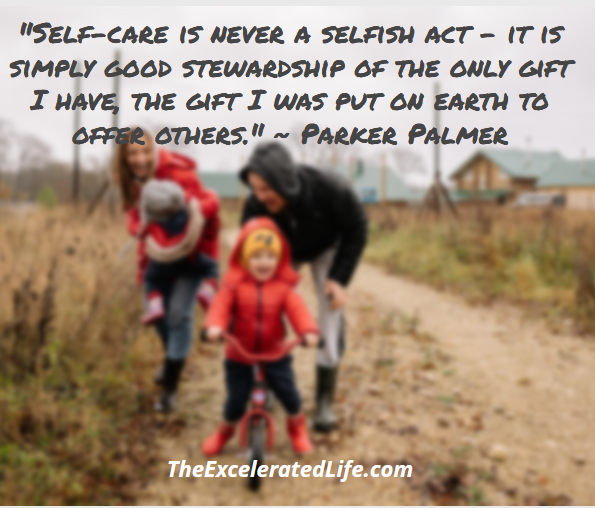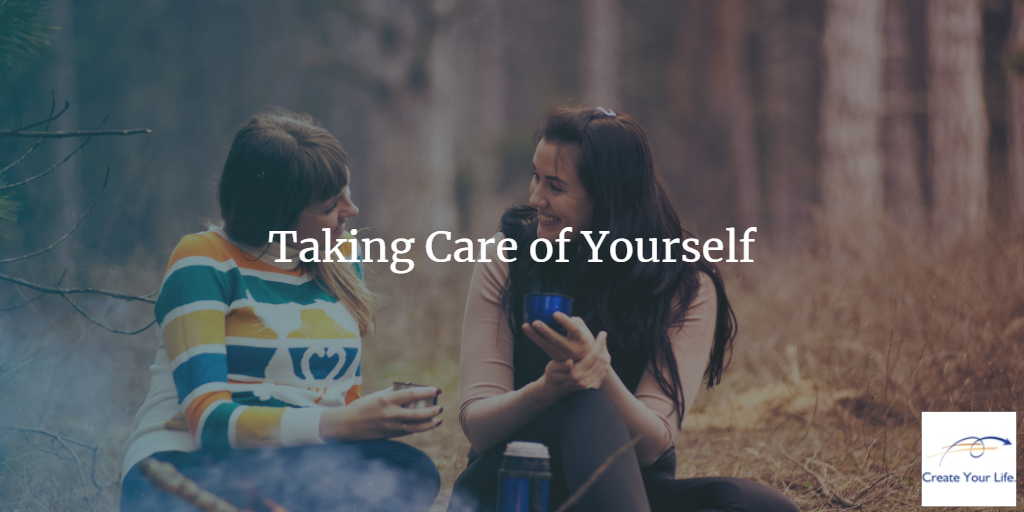Taking care of yourself is a “need to do”, not a “nice to do”.
The Ripple Effect of Self-Care and a Wake-Up Call
Once upon a time in a bustling city, there were two friends, Sarah and Emily. They both had demanding jobs, active social lives, and the usual array of everyday responsibilities.
Sarah was a firm believer in self-care. She recognized the importance of taking time for herself even with her hectic schedule. She practiced mindfulness, indulged in her favorite books and movies, and made it a point to allocate a few minutes daily to meditate and reflect. Her weekends often involved long, peaceful walks in the park, spa treatments, or simply spending quality time with herself and her family.
On the other hand, Emily, equally busy, often overlooked the significance of self-care. She continually pushed herself, thinking there was no time for relaxation and taking care of herself. She mistakenly believed she could function at her best by simply working harder and longer hours. Thus, weekends were dedicated to more work, constant social obligations, and catching up on her never-ending to-do list.
As weeks turned into months, a noticeable difference emerged between the two friends. Sarah seemed more energetic and happy. She managed her stress well, remained patient with life’s challenges, and was a source of positivity and support for her family and friends. Emily, on the other hand, was always frazzled, at the point of exhaustion, and had lost all patience. Her work started to suffer, and she felt increasingly isolated from her friends, including Sarah.
One day, Sarah invited Emily out for coffee and gently spoke to her about the power of self-care. She told her that by occasionally slowing down and dedicating time to herself, she’d become more productive and maintain better relationships. Emily, who was beginning to realize the toll her habits were taking on her life, decided to give self-care a try.
Over time, as Emily embraced self-care practices, her life gradually transformed. She found herself better equipped to handle stress, her relationships improved, and she felt more content and fulfilled. The two friends, Sarah and Emily, continued their journey together, both understanding the value of self-care and its far-reaching benefits.
Why Taking Care of Yourself Is a “Need To Do”
Being selfful is a “need to do”, not a “nice to do”. As Emily eventually discovered, you can’t give what you don’t have. Taking excellent care of yourself is selfful, not selfish. It’s filling yourself up from the inside, caring for yourself so you’ll be able to care for others.
As you and I have discussed before, we came here with a purpose. That purpose has three components, universal – being the best person you can be, unique – that special thing you (and only you) can do, and our ultimate purpose – to give our best in Service to the world. But you cannot give your best if you are constantly on the go, if your days are filled with things you “have” to do, if you’re exhausted. You can’t use your phone day in and day out, day after day after day. Periodically, you must stop and charge your phone to keep using it. Same with yourself.
You must strike a balance between production and production capability.
P/PC Balance
In successful manufacturing companies, PM or preventive maintenance is a major concern. Preventive maintenance helps to prevent breakdowns and minimize downtime, reduce repair costs, and improve reliability. We do the same thing when we have the oil changed in our cars or have an annual HVAC check-up.
In The Seven Habits of Highly Effective People, Dr. Stephen Covey calls this P/PC (or production/production capability) balance. If you run a machine, your car, your air conditioner or furnace, or yourself without stopping to care for the machine, car, furnace, or you, at some point you are likely to face a breakdown. In terms of P/PC balance, if you focus only on production output and fail to care for production capability, you’re going to break down and burn out.
It’s why taking care of yourself matters.
Why We Resist Taking Care of Ourselves
Why then do we sometimes find it so difficult to make the time to take care of ourselves?
A big reason, according to Oliver Burkeman, at least in our current culture is the feeling, or belief, or idea that if we’re not being productive, we are wasting our time. [Burkeman] We seem to have forgotten about the need to balance production and production capability.
But the truth is, says Burkeman, “spending at least some of your leisure time ‘wastefully’, focused solely on the pleasure of the experience, is the only way not to waste it – to be truly at leisure, rather than covertly engaged in future-focused self-improvement.” [Burkeman]
Not only do we think it’s wasting time, we think it’s selfish to spend time in self-care. We may feel like we’re taking time away from our loved ones or our jobs.
But there is a difference between selffulness and selfishness. Selfishness is putting our needs and desires ahead of others, usually because we are thinking only of ourselves. No one else. But when we are selfful, we are not thinking solely about ourselves. We do the things we need to do to take care of ourselves so that we can share ourselves with and take care of others. We fill our own vessel so that we then have the wherewithal to serve those we love and to give our best Service to our world.
Obstacles To Becoming Selfful
However, let’s face it. Being selfful is not always easy. Like most things in life, there may be obstacles standing in our way to selffulness.
Finding time. This can be difficult for the person juggling a career, a family, a home, other relationships, and outside interests. You may find it hard to do what you need to do, let alone take care of yourself. But remember, selffulness is a need to do, not a nice to do. If you throw yourself into daily demands without taking time to fill your own cup, you risk burnout, illness, and breakdowns in your relationships.
Putting other’s needs first. We sometimes think that the opposite of selfishness is selflessness – always putting others’ needs before our own. But see the word “less” in selflessness. Taking away from ourselves (caring less, giving less, being less) is not the best way to give to others.
Feeling guilty. One reason that can make all this hard to embrace is that most of us have been trained from an early age that being selfish is “bad”. Unfortunately, the only other option we are usually offered is to put others ahead of ourselves, to be selfless. And we’ve seen where that leads. So even though selffulness is vastly different from selfishness, if we haven’t learned to make that distinction, we feel guilty caring for ourselves.

Taking Care of Yourself Matters
Despite the obstacles and resistance, it’s necessary to balance production and production capability in your own life. Again, it’s a need to do, not a nice to do. Here are some of the reasons why taking care of yourself is important.
Better physical health. Selffulness contributes to better physical health by helping you maintain a balanced lifestyle. Plus, a healthier lifestyle can boost your immune system, helping you stay well. And becoming selfful can help you maintain energy levels and prevent feelings of chronic fatigue, especially through better sleep. Practices like relaxation techniques can contribute to improved sleep quality.
Reduced stress and improved mental health. Selffulness helps to reduce stress and its negative effects on your mental and physical health. Taking time for self-care activities helps reduce symptoms of anxiety, depression, and other mental health issues.
This leads to overall well-being. Practicing selffulness leads to an overall improved sense of well-being, including greater happiness and life satisfaction.
Being selfful leads to improved relationships. Remember what we frequently say – you can’t pour from an empty cup. When you care for yourself, you have more to give to others.
Taking regular breaks and practicing self-care can boost your productivity and creativity and prevent burnout, especially in high-stress jobs.
Finally, becoming selfful increases your resilience. Selffulness can help you better cope with life’s challenges and setbacks.
How To Take Care of Yourself
Here is a list of resources you can use as you begin to take good care of yourself.
10 Ways To Take Good Care of Yourself
How To Take Excellent of Yourself – And Why
Fill Your Cup
The Excelerator JumpStart – Excelerated Selffulness
However, don’t spend a lot of time reading and researching. Instead, pick one thing you can begin today to start taking excellent care of yourself. If you’re already practicing Excelerated Selffulness™ – and I hope you are – how can you up your game? What small step can you take (right now or later today) to put your idea into action? When will you do it? How will you celebrate once you’ve completed it?
Remember the Ripple Effect
For most of us, becoming selfful takes time and practice. But remember and heed the lessons of our friends Sarah and Emily. If you don’t take care of yourself, over time your energy is drained, stress levels rise, and you have less and less to give to your family, your friends, and your world.
On the other hand, if you pay attention to the balance between production and production capability, you see your energy levels increase, your positivity rises, your stress lowers and you are better able to give your best to your world.
So be mindful of the obstacles and your own resistance to becoming selfful and do what you need to do to take good care of you. Remember, it’s a need to do, not a nice to do. I encourage you to replace thoughts of being selfish with being selfful . . . caring for yourself and filling your own vessel so you can better serve others. That is embracing your Excelerated Life™!
How are you balancing your production and production capabilities?
What is one small action you could do today to begin to take good care of your most important asset?
Share your ideas by leaving a post below.
Excelerated Selffulness™ — taking excellent care of yourself — is one practice for creating your Excelerated Life™, a life of flourishing and well-being, and a life of meaning, purpose, and service.
Read more about the Excelerated Life™.
Resources:
Burkeman, Oliver. Four Thousand Weeks: Time Management For Mortals. New York: Farrar, Straus and Giroux, 2021.
Covey, Stephen R. The Seven Habits Of Highly Effective People. New York: Simon & Schuster, 1989.
This blog post includes research information and suggestions provided by ChatGPT, an AI language model developed by OpenAI. The content was generated with AI assistance and is intended to provide information and guidance. Please note that the suggestions are not official statements from OpenAI. To learn more about ChatGPT and its capabilities, you can visit the OpenAI website.



One Reply to “Taking Care of Yourself”